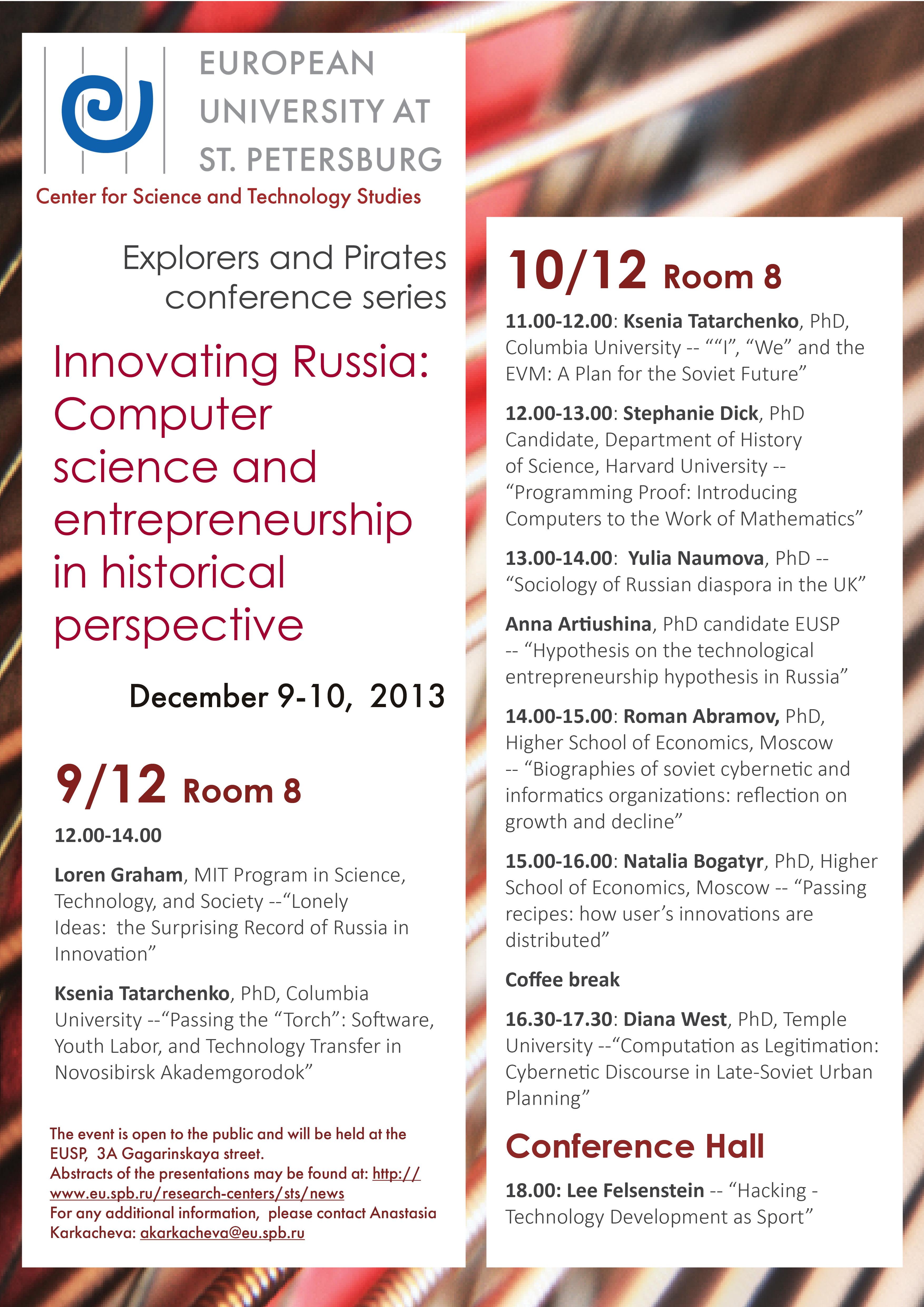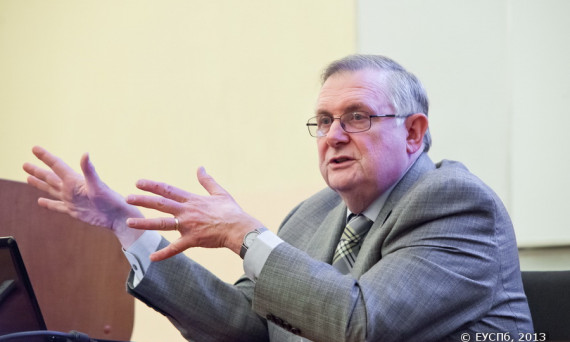 On December 9 and 10, 2013, a panel of young Russian social scientists recently graduated from American and Russian institutions presented their research on the topic of computer science and innovation in the Russian context. In introduction and conclusion, Loren Graham and Lee Felsenstein presented their research findings on recent innovations trends.
On December 9 and 10, 2013, a panel of young Russian social scientists recently graduated from American and Russian institutions presented their research on the topic of computer science and innovation in the Russian context. In introduction and conclusion, Loren Graham and Lee Felsenstein presented their research findings on recent innovations trends.
Program:
Monday December 9. Room 8
12.00 – 14.00
Loren Graham, MIT Program in Science, Technology, and Society
"Lonely Ideas: the Surprising Record of Russia in Innovation"
Russians have often claimed that they invented many of the most important technologies of modern civilization: the steam engine, the lightbulb, the radio, the airplane, the transistor, the laser, the computer, fracking, and many other devices, machines, and technological processes. Western commentators have ridiculed these claims. Close research in the Russian sources shows, however, that the Russians have absolutely legitimate claims to being pioneers in the development of all these technologies. But a central question then emerges: if the Russians have been pioneers in all these fields, why is Russia today so weak a player in world technology? The Russian economy is largely dependent today on oil and gas; it is difficult to name a Russian high-technology manufacturer that is world class. For three hundred years Russia has been adept in developing clever technical ideas and abysmal in benefitting from them. Hence the title of my new book: Lonely Ideas. Russia is the home of lonely technical ideas that never find acceptance as world innovations helping the Russian economy.
Answering the question why Russia has not been able to commercialize its clever ideas requires social analysis (or STS analysis). I have concluded that the major barriers to Russia’s emergence as a high technology power are not technical, but social, political, and economic. The major barriers are attitudes, the political order, social barriers, the legal system, the investment climate, corruption, and the organization of R&D. In my talk I will briefly discuss each of these and ask the question: Can Russia now break out of its 300-year-old trap and emerge as a high technology superpower? Are such recent efforts as Skolkovo and Rusnano the answer to the problem or just additional spasms in the repetitive Russian pattern of failure to carry through to true innovation?
Ksenia Tatarchenko, PhD, Columbia University
“Passing the “Torch”: Software, Youth Labor, and Technology Transfer in Novosibirsk Akademgorodok”
By the late 1960s, the Western computing community discovered that software production was in “crisis,” as the software emerged as a new, valuable commodity requiring novel labor arrangements and types of innovation. In the Soviet Union, software, neither high status academic research nor low status technical service, also did not easily fit planned economy and academic structures. This paper uses the case of the Komsomol-sponsored association “Torch,” which thrived in Akademgorodok of the late 1960s before being shut by the authorities in 1972, to situate Soviet software production in relation to youth labor, knowledge regimes, and technology transfer. Although brief, “Torch's” contribution to software development illuminates how the Soviet economy of risk involved in invention to innovation transition was negotiated on the local level. Simultaneously, placing the story of Akademgorodok's “Torch” in a larger context of innovation in computing technology allows to question the common interpretation of the firm’s trajectory as a conflict between young entrepreneurs and old apparatchiks.
Tuesday, December 10. Room 8
11.00 – 12.00
Ksenia Tatarchenko, PhD, Columbia University
“"I", "We" and the EVM: A Plan for the Soviet Future”
Soviet computer scientist and programmer Andrei Ershov believed that by “exercising to control the computer, the human develops his capacity to control himself.” Thus, the Sovietversion of the “information society” was predicated not on the availability of personal computers– the black boxes with opaque interfaces manipulated by an elite group of experts – but on everyindividual’s capacity to communicate with the machine. I study Ershov’s conception ofprogramming behind the 1985 curriculum reform to argue that the debates surrounding theschool informatics illuminate notions of individual “personhood” and the role of Sovieteducation and media in articulating and inculcating a shared “socio-techical imagination.” Byplacing the EVM (Elektronnaia Vychislitel’naia Mashina) alongside with the “I” and the “We”,we gain a remarkably forward-looking perspective on a society which was about to cease itspolitical existence.
12.00 – 13.00
Stephanie Dick, PhD Candidate, Department of History of Science, Harvard University
“Programming Proof: Introducing Computers to the Work of Mathematics”
The advent of modern digital computing in the mid-twentieth century precipitated many transformations in the practices of mathematical knowledge production.However, early computing practitioners throughout the United States subscribedto complicated and conflicting visions of what the computer could contributeto mathematics - each suggesting different hierarchical divisions of mathematical laborbetween humans and computers and different visions of mathematical community andpractice. Some imagined computers as mere plodding “slaves” who would take over tediousand mechanical elements of mathematical research. Others imagined them moregenerously as “mentors” or “collaborators” that could offer novel insight and directionto human mathematicians. Still others believed that computers would eventually becomeautonomous agents of mathematical research. And computing communities didnot simply narrativize the potential of the computer differently; they also built thosedifferent visions right in to computer programs that enabled new ways of doing mathematicswith computers. With a focus on communities based in the United States inthe second half of the twentieth century, this talk will explore different visions of thecomputer as a mathematical agent, the software that was crafted to animate thoseimaginings, and the communities and practices of mathematical knowledge-makingthat emerged in tandem.
13.00 – 14.00
Anna Artiushina (EUSP), Dmitry Zhikharevich (SPbSU / EUSP)
“The Brief History of IT Industry in Russia”
This presentation is aimed to give a brief overview of the Russian IT industry development since Post-Soviet times. The main question is to show, what kind of factors (incentives or barriers) promote standing of Russian IT business.
14.00 – 15.00
Natalia Bogatyr, PhD, Higher School of Economics, Moscow
“Passing recipes: how user's innovations are distributed”
This presentation focuses on the “domestication” of hard disk drives’ technologies and the development of the data recovery market in Post-Soviet Russia. Drawing on 3.5 years ethnographic research with one data recovery service center in Moscow and on 12 in-depth narrative semi-structured interviews with computer technicians in Moscow, Saint-Petersburg, Rostov-on-Don and Minsk, I argue that lead users were centre players in these developments. I narrow and specify E. von Hippel’s definition of lead users, stressing as main characteristics their abilities to invent and to materialize their inventions to create new marketplaces through commercialization of their technological innovations (or, in other words, the ability to complete an innovation cycle by themselves).
The questions posed in this presentation are:
- Who were those lead computer users who invented data recovery as a new service in Russia?
- In which directions did they transfer their innovations?
- Which ways and means did they use?
To address these questions, the presentation proceeds through five sections and examines the social basis of data recovery and the history of this field; the practices of transferring innovation vertically (to producers; “invention”), horizontally (to other lead users; “objectification”) and downwards (to domestic users; “commercialization”); the dynamics of data recovery as a “cultural recipe”. To analyze data, I have adopted some grounded theory techniques, thus the result of my undertaking is a “theory” which explains data recovery market development as an evolution of computer users’ cultural recipes. The presentation concludes with an assumption that, in Russia, certain innovations in other commercial or industrial fields (for example, automobile electronics) could be initiated by lead users and organized along similar lines to data recovery.
15.00 – 16.00
Diana West, PhD, Drexel University
“Computation as Legitimation: Cybernetic Discourse in Late-Soviet Urban Planning”
This paper will focus on the late-Soviet period of the 1970s and 80s, and the discourse surrounding computation, and, specifically, cybernetics, in urban planning. Whereas elsewhere in the world, the field of cybernetics was losing traction, Soviet planners continued to envision its vast applicability to managing the national economy and growing the urban infrastructure. I will look at particular case studies in the work of the architectural historian and critic Vyacheslav Glazychev, as well as several prominent publications in the field. My essay will argue that as the shortcomings of the urban planning program became more and more apparent, Soviet planners blamed the government’s inability to adequately computerize planning for its failures. Often critical of the existing conditions, planners nonetheless imagined computation and cybernetic theory as the eventual, scientific solution to the problem of socialist governance. In examining this discourse on cybernetics and computation, my paper will raise questions about interdisciplinary knowledge transfer, and what the very idea of computation meant to late-Soviet theorists struggling to envision a comprehensively planned spatial and economic system.
16.00 – 16.45
Coffee break
18.00, Conference Hall
Lee Felsenstein, Fonly LLC, Palo Alto, CA
“Hacking - Technology Development as Sport”
We will examine the phenomena of "hacking" as bipolar and derivative of thebipolar nature of the human psyche. Considering it as a technological expression of the"revolt against institutions" - a heritage of the Enlightenment - we will see how theexistence of vast, complex technological systems (e.g., telecommunications, computation)attracted the informal attention of young technologists who approached the achievement ofunauthorized mastery as a form of non-corporeal sport. We will examine the effects ofthis approach on the practice of technological development - especially in the software arena.




















